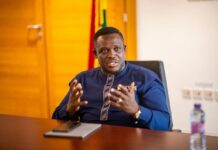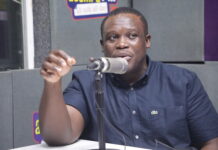The Member of Parliament (MP) for Ningo-Prampram is insistent that the 1992 Constitution of the Republic of Ghana does not consider same-sex relationships as a fundamental human right.
Speaking on Joy FM’s Midday News, Friday, Sam Nartey George, said homosexuality is regarded as a human preference. He, therefore, dared persons, including legal practitioners, who hold opposing views to prove otherwise.
“Homosexuality is not a fundamental human right. Show me where in the 1992 Constitution it says that sexual preference is a fundamental human right. The laws of Ghana are clear. I challenge anybody, any lawyer in this country to show me. Homosexuality is a human preference, it is not a fundamental human right,” he said.
His comment comes at a time when members of the general public are expressing diverse opinions on a private member bill sighted on social media against the involvement, promotion, propagation, advocacy, support or funding for LGBTQI+ related activities.
The 36-page anti-LGBTQI+ bill revealed some eight legislators who are spearheading the fight against same-sex relationships in the country. They are Sam George, Ho West MP, Emmanuel Bedzrah, MP for Kpando, Della Adjoa Sowah, John Ntim Fordjour, the MP for Assin South.
The rest are MP for Tamale North, Alhassan Sayibu Suhuyini, La Dadekotopon MP, Rita Naa Odoley Sowah, the MP for Krachi West, Helen Adjoa Ntoso, Rockson-Nelson Dafeamekpor, the MP for South Dayi.
Portions of the Bill state that individuals of the same sex, who engage in sexual intercourse, are “liable on summary conviction to a fine of not less than seven hundred and fifty penalty units and not more than five thousand penalty units, or to a term of imprisonment of not less than three years and not more than five years or both.”
Also, it proposed that; “a person who, by use of media, technological platform, technological account or any other means, produces, procures, markets, broadcasts, disseminates, publishes or distributes a material for purposes of promoting an activity prohibited under the Bill, or a person who uses an electronic device, the Internet service, a film, or any other device capable of electronic storage or transmission to produce, procure, market, broadcast, disseminate, publishes or distribute a material for purposes of promoting an activity prohibited under the Bill, commits an offence and is liable on summary conviction, to a term of imprisonment of not less than five years and not more than ten years.”
The Bill further suggests that persons who engage in activities that “promote, support, express sympathy for or call for a change of public opinion towards an act prohibited under the Bill”, are liable on summary conviction to a term of imprisonment of not less than five years or not more than 10 years.
Although Mr George declined to expatiate on the nitty-gritty of the Bill as it is undergoing gazetting, he, nonetheless, described as comical, the interpretation being put across by some members of the public.
According to the Ningo-Prampram legislator, “the issues that are defined as crime or as offensive in the acts are clear. A conversation or an interview of this nature, I do not believe is promoting homosexuality. We are clear in the language we used in the Bill. I’ve seen all kinds of interpretation being put out there but I take that as a comical aspect of Ghanaian lives.”
On the issue of advocacy, he stated that armed robbers and prostitutes are not provided with the platform to clarify why they are engaged in such acts, hence, the same should be replicated for persons involved in same-sex relationships.
“If you won’t do that, why will you be granting a platform for clarity on something the laws of Ghana say is illegal. Interviews with the prostitutes are not meant to understand and give them a platform to push their trade. That in itself will be illegal,” he added.





